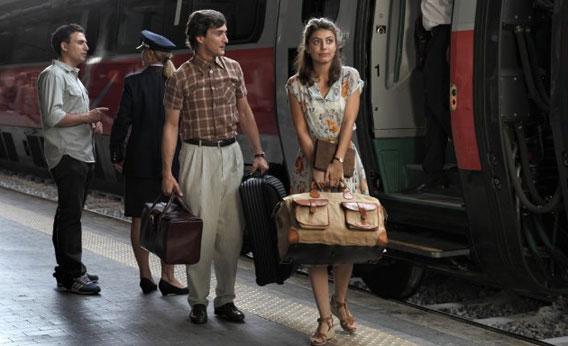Woody Allen’s To Rome with Love isn’t so much a movie as a box of notions—“notions” both in the sense of half-formed ideas and of random odds and ends, buttons and ribbons and scraps of lace. Allen seems to be digging through a career’s worth of unused (or in some cases, recycled) material and finding new ways to collage it together, with alternately tiresome and pleasing results. At times this multiple-plot meander through the glorious labyrinth of the Eternal City can feel aimless, even lazy. But in the film’s best moments, that willingness to wander works to its advantage.
Let’s start with the best of this portmanteau movie’s four separate storylines: A successful middle-aged architect, John (Alec Baldwin), who’s vacationing in Rome with his wife and some friends, excuses himself from sightseeing to visit the neighborhood where he spent a year in his student days. There, he meets Jack (Jesse Eisenberg), an architecture student not unlike his old self, who recognizes John (“Don’t you design shopping malls?”) and invites him up to his apartment for coffee. Soon, John finds himself offering unsolicited advice on the love triangle that develops among Jack, his girlfriend Sally (Greta Gerwig), and Sally’s best friend, a narcissistic but irresistible actress named Monica (Ellen Page).
I admired the way Allen subtly shades this plotline from the realistic to the fantastical: At first, John and Jack seem to be interacting in the real world, but it soon becomes clear that either Jack is imagining an older mentor who follows him everywhere, or John is reliving a painful episode from his own youth with the details slightly changed. Or maybe the two men dreamed each other up? Allen’s touch is light enough in this part of the film that all these possibilities seem to coexist and enrich one another—and it doesn’t hurt that Baldwin and Eisenberg are superb together, with a chemistry that brings out both the comic and melancholic elements of the story. Gerwig and Page don’t get much to do other than represent two classic Allen archetypes—the patient, forbearing girlfriend and the neurotic femme fatale—but still, the young-architect-in-love plotline felt to me like the movie’s most finished element.
The same can’t be said of a plot thread involving Roberto Benigni as Leopoldo Pisanello, an ordinary middle-class nobody who wakes up one day to find himself inexplicably famous. After a lifetime of offering his dull opinions at the office water cooler, suddenly he’s being breathlessly interrogated on morning news shows about the banal details of his quotidian existence: Does he shave before or after breakfast? Sleep on his stomach or his back? There’s much to admire in the casual absurdism of the Pisanello storyline (which is scripted entirely in Italian). The scenes of this baffled everyman dodging crowds of squawking paparazzi function both as a scathing critique of reality-TV culture and a semiautobiographical confession about Allen’s own relationship to fame. And Benigni, a gifted physical comedian, brings both pathos and physical grace to the role. But this story bogs down in its own sourness; ultimately, Allen’s thinking about fame extends no further than “fame sucks,” and by the time Pisanello’s one-note story draws to a close, we’ve more than gotten the point.
There are two more storylines left in the box of notions: One involves a naive provincial couple visiting Rome who get mixed up in a day of mistaken identities and potential infidelities: The man (Alessandro Tiberi) winds up passing off a prostitute (Penelope Cruz) as his new bride to his family, while the woman (Alessandra Mastronardi) finds herself in a dalliance with a suave movie star (Antonio Albanese). The other features Allen himself as Jerry, a retired opera director whose daughter (Alison Pill) is engaged to an Italian (Flavio Parenti). When he hears his future son-in-law’s father (Fabio Armiliato) singing Verdi in the shower, Jerry is transported, and insists that the poor man, who wants nothing more than to practice his lifelong vocation as an undertaker, allow himself to be promoted as the latest operatic sensation. To me, both these stories felt like unfinished sketches; similar to the Pisanello plotline, they contain ideas about fame, anonymity, success, and failure that are never fully developed or explored. (Though the opera subplot does culminate in a ludicrous staging of Pagliacci at La Scala that makes the whole thing worthwhile.)
It would require a separate essay to express the peculiar melancholy I feel about Woody Allen’s current incarnation as a maker of wistful European travelogues (Midnight in Paris, Vicky Cristina Barcelona, and the various films he’s made set in London). On the one hand, it’s nice to see him enjoying himself in the fresh air after the bitter, stagnant feel of his late New York-set films (Anything Else, the dreadful Whatever Works). And Allen’s partnership with the cinematographer Darius Khondji has given viewers some mouthwatering opportunities for vicarious travel. But Allen lets both himself and his characters (especially the men) off the hook too easily: There are plenty of ideas, but not enough effort or genuine introspection. Even as Allen invites us to explore historic neighborhoods in the world’s most exquisite cities, it’s hard to shake the feeling he’s slumming.
